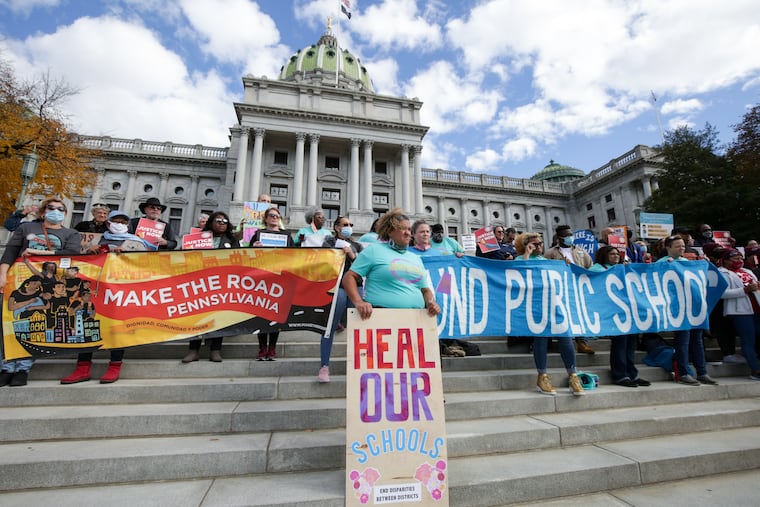In Philly schools, decisions must often be ‘revenue-driven ... as opposed to needs-driven,’ CFO testifies in funding trial
“It's not conducive in an educational environment” to add staff and supports and then take them away, but Philadelphia’s back is to the wall financially, district CFO Uri Monson testified.

When Uri Monson started his job as the Philadelphia School District’s chief financial officer in 2016, his first phone call was to a lawyer discussing the possibility of the district defaulting on $600 million in debt.
Bruised from massive cuts to state aid that forced 3,000 layoffs, and hamstrung by a standoff over Pennsylvania’s budget, the district was in such a tough spot that “there were meetings going on literally about which bills had to be paid now and which could be delayed,” Monson testified in a landmark education-funding trial Monday.
Six years later, the district is in better financial shape — and never had to default on its financial obligations — but better is relative, Monson said. The way Pennsylvania funds education means Philadelphia is perpetually on shaky financial ground.
» READ MORE: Superintendent Hite testifies Philly students meet minimal standards ‘because that’s all they have access to’
The district now projects a $260 million budget gap by 2025, in part because its fixed costs are rising and some revenue has shrunk. (In Philadelphia, schools are funded in part by city liquor-by-the-drink and use and occupancy taxes and parking revenue — all took a hit during the pandemic.) Absent new revenue, the district will have to lay off teachers, counselors, administrators, reading specialists, and other employees it hired with pandemic relief funds to support 120,000 students, Monson said.
“It’s not conducive in an educational environment” to add staff and supports and then take them away, but Philadelphia has no choice, Monson said during a Commonwealth Court hearing in Harrisburg.
Though Philadelphia is not one of the plaintiffs in the ongoing case — brought by six school districts, groups including the Pennsylvania NAACP and some parents — its outcome matters much to the school system. Petitioners say the way Pennsylvania funds schools violates the state constitution, is inequitable and inadequate.
Philadelphia is unique among Pennsylvania districts: Its school board has no revenue-raising authority, so it relies on City Hall and Harrisburg for funding. Its residents are relatively highly taxed, but there’s a gap between what Philadelphia students need and what they get in schools.
“We spend almost the least in the state, despite having the highest need in the state,” Monson said.
The district spends close to the state average per student, but when adjusted for student need, it ranks below many districts. Philadelphia’s weighted, per-student expenditure — a need-adjusted measure of what districts actually spend — is $10,796 per student; the state average is $13,688. Lower Merion, by comparison, spells $26,362 per student.
Because many Philadelphia students require special education services, are homeless, live in foster care or in distressed communities, the cost of educating them is high, Monson said. City students often lack “things that should be basic in order to be prepared for education. We have to supplement in order to make up for that.”
Inadequate finances mean trouble for the district’s 300 mostly old buildings, many of which are plagued by lead paint, asbestos, and systems problems. District officials say it would take an estimated $4.9 billion to fix everything that’s wrong with Philadelphia’s school buildings.
Officials are “constantly making choices,” Monson said: Which urgent facilities issues do you address, because you don’t have money to pay for all of them?
“All your decisions are revenue-driven, resource-driven, as opposed to needs-driven,” Monson said.
Although Pennsylvania adopted a new funding formula in 2016 that drives more dollars to needier districts, the new formula is only applied to a tiny percentage of state money.
The school system has gotten about $200 million in new money from the state since 2014-15. Under the old formula, it would have gotten $159 million. That $41 million rise over six years is a drop in the bucket for the district and its $3.5 billion annual budget, Monson said.
“It’s some additional money, but over time, expenses have gone up during that same period — in particular, expenses over which we have no control,” said Monson, adding that he’ll take every dollar offered, and put it to good use. “But we were behind to begin with, and it hasn’t caught up.”
Also on the witness stand Monday was Michael Horvath, who graduated from the Wilkes-Barre Area School District in 2019.
Horvath was an eighth grader when he and his mother became petitioners in the lawsuit in 2014. During his years in Wilkes-Barre, Horvath dealt with roaches and rodents in his classrooms, broken desks, and textbooks that were missing pages. Despite getting decent grades in high school — Horvath had a B average — he didn’t learn how to write research papers or use a library. On state exams, Horvath earned “basic” or “below basic” status, the lowest two categories of achievement.
“It’s very diminishing, embarrassing, seeing basic and other kids seeing basic on your paper. It’s not a good feeling, not at all,” said Horvath.
When he landed at Utica College in New York, Horvath was unprepared for classes and lacked basic skills, he said. He eventually left Utica, then King’s College in Wilkes-Barre, where he didn’t finish a single semester.
Horvath said he believes he did not receive an adequate education in Wilkes-Barre’s public schools and lamented the wide gulf between the schooling available to children in wealthy districts and in districts like his.
“It made you feel like you were less — it made you feel like, why aren’t you getting what you deserve, why are we being treated like this? It didn’t seem fair,” said Horvath.
Petitioners in the trial, which began in November and is expected to stretch into February, are expected to wrap up their case this week.